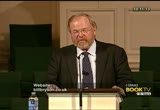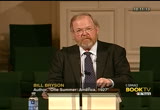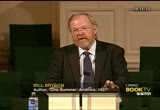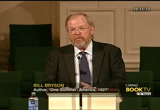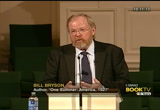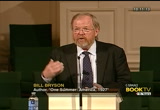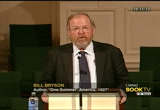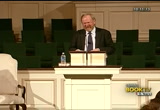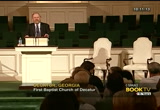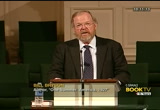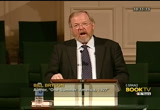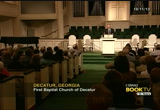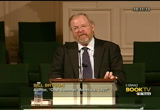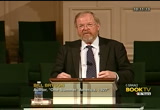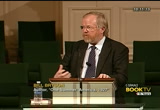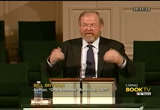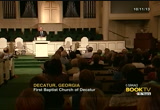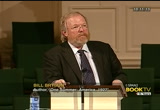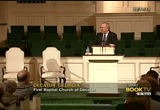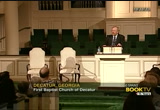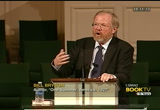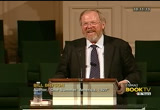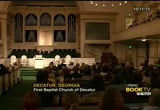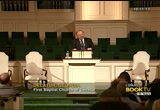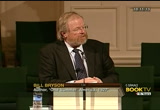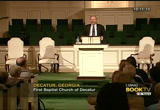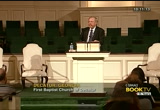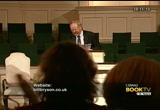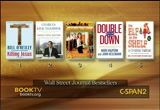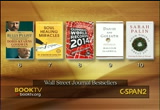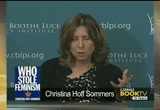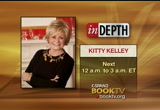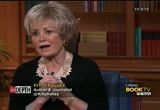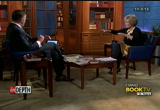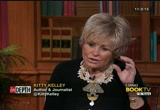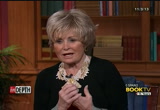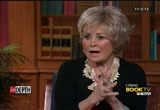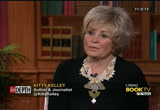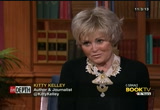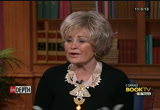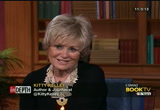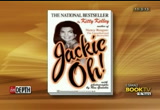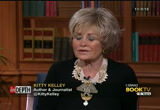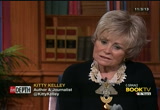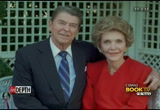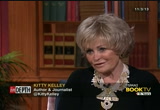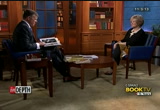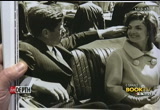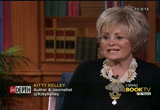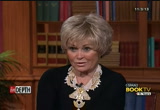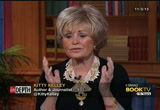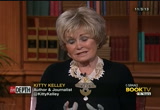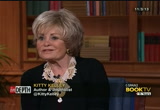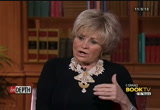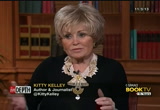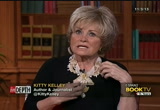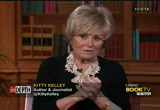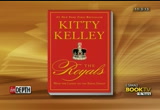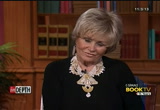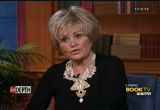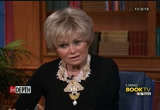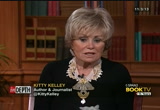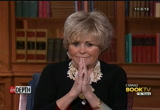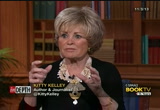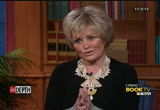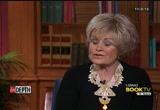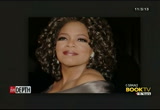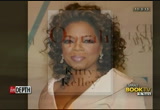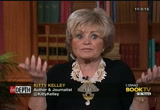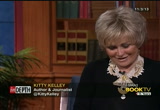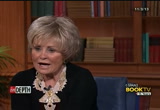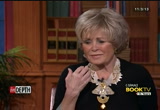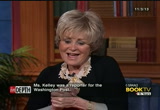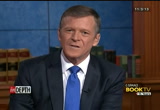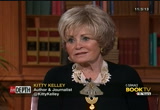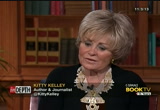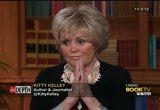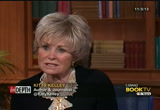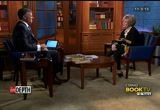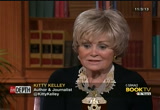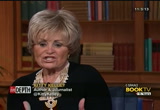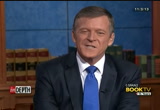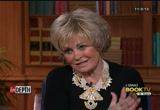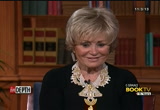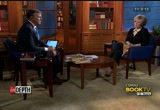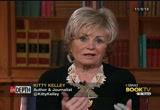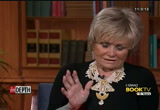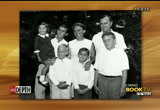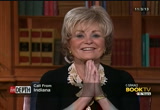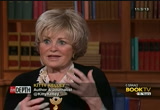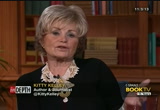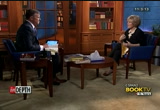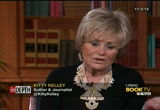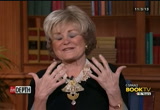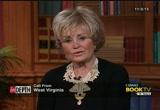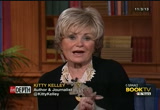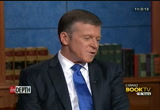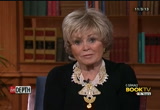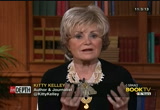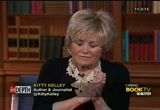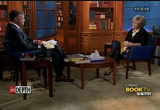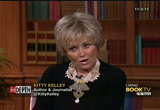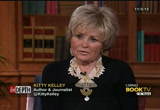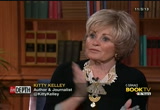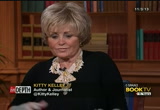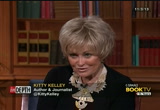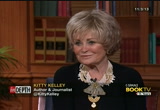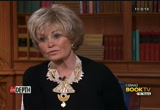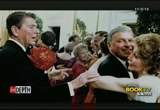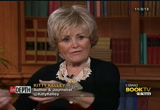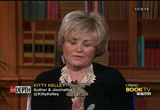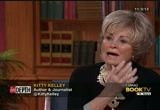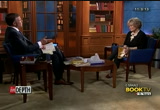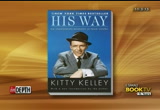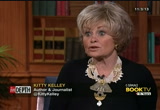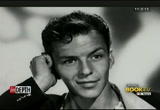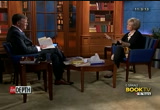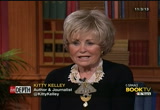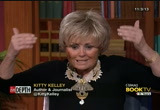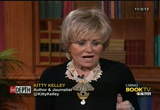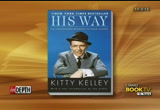tv Key Capitol Hill Hearings CSPAN November 29, 2013 12:00am-2:01am EST
12:00 am
i want to tell you two stories . .ory. the bear story is an experience i had many years ago now when i tried to hike the appalachian trail in the company of a slightly challenging companion who i named stephen katz in the book. the appalachian trail, as must surely know, starts in northern part of the state and runs for 2200 miles in maine. and it's really hard. if you wrote the book you'll know i grew preoccupied with the danger of bear attack while hiking in the eastern woods. i know, bears in eastern united states don't attack very often. the thing is with respect to any individual, it only has to happen once. [laughter] so i was concerned about the danger. and i was gratified to discover after the book came out that lots of people all over north
12:01 am
america shared these concerns. because i got letters by the sackful from people giving me advice on how to avoid bear attack while hacking. here the basic advice seems to be to go hiking with someone who can't run as fast as you can. [laughter] but there was one letter i got from a lady in new hampshire that pleased me. when you go hiking out west in grizzly bear country. two things they tell you you should do whenever you go. first, you should wear bells on the clothing. because this alerts the bears you're coming and don't overtake them by surprise. the second thing they tell you you should do everywhere you go look on the ground in front of you for grizzly bear dung. the way you can recognize it has bells in it. [laughter]
12:02 am
it's one other story i want to tell you. it's on my mind. when i say i'm happy to be back in america. i'm happy for all kinds of reasons. but one of them because it's the world series. it's the playoffs of the world sugary series. i know, it's slightly a touchy issue in atlanta. i'm excited. [laughter] i'm excited. living in england, the one thing that is the one experience that cannot be replicated abroad. it just doesn't work over there. so to be here, and i'm here through the whole world series has gotten me excited. i'm hoping i'll be to be watch some of the playoffs in the world series games. whoever is in it, if will be exciting to me. you see, the other person who was extremely influential to me for obviously reasons growing up was my father. i was close to my dad. and he was a sports writer for the "des moines register ." it was a minor league city. one of the treats every year for
12:03 am
40 years they sent him to the world series. every year he got to go. it was by far the biggest event in his whole year. he would get the suitcase down a month before it was time to go and he would pack it and be thinking about the word robe. it was obviously very important occasion to him. would be gone for three weeks. and when he would come home he would tell us not just about the baseball which he had seen which was tremendously exciting. it was a great era of willie mays. but he would be telling us about the exciting places he had been. where the world series was that year. from des moines, iowa those places seemed exotic to us. he would talk about san francisco or new york or los angeles whenever he happened to go. so i got the impression that going to the world series was the single most exciting thing that any human being could do. i always ached to got world series. all the things i wanted to go going to the world series was the most important.
12:04 am
i have never gotten to go. i have the wonderful experiences. i was sent to the olympics in 2000. and i went the soccer world cup in korea and japan. lots of other important global sporting events. i was delighted to go. one thing that eluded me was the world series. it happens that almost exactly ten years ago, in 2003 season was coming to an end, a very good friend of mine, a guy named keith black moor, the sports end or it of the london times called me up at home. i was in england. he said have you been following what is going on in baseball? i said have i ever? because what was happening at the 2003 season was coming to a close, was the two teams that had the most momentum going to the playoff period were the chicago cubs and the boston red sox. i know, the red sox have had a lot success in recent years. at this time in 2003, they still hadn't won a world series since 1918. the cubs stilt haven't.
12:05 am
they haven't won won since 18980. in 2003 they had something like 180 years of collective failure between them. it looked as if they were the two teams that were likely to get to the world series. if it happened you could imagine it would be the most exciting world series. one team or the other would to break a decades long drought. and the joy in the winning city would be indescribable. so keith, my friend from london times understand baseball said, look, we've been talking about it at the office. we're thinking for it happens to be the cubs and the red sox and the world series this year, would you cover it? we think it would take an american to explain to a british readership the improbable glory of the particular period of two teams. would you be willing to go? i've been dreaming for my whole life! i'll go for free! you don't have to pay me! get me tickets to the ballpark and a hotel in each city. i'll take care of the rest.
12:06 am
what i'm going go now, keith, i cannot let you change your mind about this. i'm going to get my pen and record this in ink with your on the other end of the phone and confirm you never ever are going back on this. you would break my heart. you understand? he said absolutely. i got my stuff and came back to the phone and open to the right page and i made a noise and said, keith, i can't believe it. i can't got world series this year because it happens my daughter is getting married that week. [laughter] and he was quiet for a long time and said, look, bill, your daughter may get married again. [laughter] so i didn't get to got world series. the cubs and the red sox didn't get in to. it he sent me the next year in 2004 when the red sox broke the curse.
12:07 am
it was the most joyous event in my whole life. outside of childbirth and all the other things. [laughter] and actual, it was pretty close to childbirth. [laughter] it was fantastic. and on that note of happiness, i'm happy to open the floor up to questions if anyone has any? do they have to come up here? [applause] oh, thank you. [applause] [inaudible] i didn't meet any interesting scientists. really. the whole idea when i did the book i was going to -- i was going to go spend a lot of time with scientists watching them work. that was the initial thought. and so i went out with a few and
12:08 am
i realized very quickly that scientists are very boring when they're working. they are. almost without exception. a few kind of are agreologies and people got field dos interesting things. a typical scientist sits a the the computer screen all day silently tapping keys and that kind of thing. and doing desk work. they -- i couldn't stand there and keep asking them questions. what are you doing? what does that equation mean? and anyway it wouldn't be interesting. it wouldn't translate to anything interested. i realized early on i would have to approach the book in a different way. the whole idea of the book, i should perhaps say, that i was terrible assigns in -- terrible assigns in -- science in school. there ought to be some level i can engage with science and scientists. was fascinated to know not just what we know but how do we know what we know. that's particularly interesting how do we know how hot it is on the surface of the sun or where
12:09 am
the continentings were 350 million years ago. i think it's amazing scientists can figure it out. my thinking i was going to go and look over their shoulder while they work figuring it out. when they figure them out it's not interesting at all. they are point -- doing very kind of accountant work. i had to read a lot and interview scientists when they weren't working and tell me what it is they were doing and explain to me why it was they interested were in their particular field and what was that fascinated what drew them to the particularly usually some extremely area. and i was interested in that. what made you decide to spend your whole life looking at liken or just, you know, some cluster of stars. and they were almost delighted to have somebody be interested. it was very happy experience. but i had to approach the book in a completely different way from the way i had expected to.
12:10 am
when you started to hike the ap, was it your intent to go the whole way? my youngest son hiked it. before he went up, a neighbor gave him the book, "a walk in the woods" and said it was great but he didn't finish. why did you give me the book? [inaudible] all the way. >> that's amazing. >> i wondered if you intended to finish. >> i sincerely intended to finish. absolutely intended to finish. we realized pretty early on that we weren't going to make it. [laughter] i can remember clearly when was dawning us this is just way beyond us. and the fact is that, you know, that's a moment that comes to 90% of the people who set off on the appalachian trail intending to hike it and end. 90% of them don't make it.
12:11 am
most of them get a little further before they realize what utter failures they are. [laughter] for several days. i didn't dwell on it in the book. for several days i was quite gloomy and disrespondent about this. i thought i have to hike it. i promised publishers i would deliver a book. and in interviews i announced i'm hiking the appalachian trail. so i sort of publicly committed to it. i a book contract in the back pocket. my sense of failure was really profound. believe me. and yet, you know, i also realized simultaneously with all of that i'm not going to do it. i can't do. it's not the physical side of it. which is hard enough but it's the mental side of it. and the idea can you go this? can you be separate for your family for five months. put up with the sort of endless repetition and the kind of roughing it.
12:12 am
going night after night without showers and hot meals and those kinds of nights. it's hard. it takes a lot. your son, i'm full of admiration of him and anybody who does the appalachian trail from end-to-end. whether they walk it in one stretch or section hikes. it's an incredible achievement. you can't imagine how far 2200 miles until you try to walk 2200 miles. it was a disappointment to me i didn't do it. but after a kind of agonizing over it for a few days. i decided what we decided jointedly we still enjoy walking. we're never going do the whole thing. we don't want to quit. we're going to -- we'll just what do what we want. it we are doing it apart and whatever reason we don't like that part if it's boring or, you know, we think have more fun in the smokey mountains or something. we'll go on ahead and move elsewhere. that's what we did. and we a fantastic experience as a result. and at the point i try to make
12:13 am
in the book was that, you know, it's the greatest thing in the world if you can caulk the appalachian trail from tend end. it's also great thing to walk it as much as you can. and as much as you want. this is a sort of -- i think, with a terrible notion in the walking community. it's either an all or nothing thing. and i think that's really wrong. if you can do it all fantastic, if you can't do it all you should do what you feel like doing. and we had a wonderful summer. i can't remember exactly what the mime age was 800 some miles. we walked from the equivalent from new york to chicago. that seems like a pretty good hike to me. i never apologized to anybody for failing. i feel people who fail shouldn't feel like failures. you can still succeed in all kinds of other levels. another point i always make in these situations is that you are so lucky in this country. we're so lucky to have something like the eastern woods, you
12:14 am
know, all of you here just there it's north of the city. it begins. and, you know, you can go out there and just experience a little bit of it. you really ought to. even if you are not a great hiker. you taught go out there. the thing that is amazing about the woods along the appalachian trail. it's like time travel. you are going to a landscape that is completely divorced from modern life very often. you're so far out. you are in -- in a time that would have been completely familiar to danielle boone or george washington or anybody from the 18th century. early 19th century. it's an amazing thing. we have it right here. you have it on the doorstep. it's something that should be valued and should be used utilized. but pure will toy the extent you are comfortable doing that.
12:15 am
sir? [inaudible] [inaudible] [inaudible] [laughter] [inaudible] >> okay. what i did was that all of my books and it's important to distinguish between me and historians is that i'm a reporter. that's all i've ever seen myself doing. what i'm doing in the books is saying -- i'm saying here is what, you know, people have said.
12:16 am
so i was talking about the way people talk in the 18th century. i'm essentially relaying information. it's not stuff i found out myself inspect is stuff i'm relaying the scholars, historian, various academics and people like that. this is, you know, they have found. really i'm doing the same thing i did if i was doing a newspaper or magazine article. i'm finding out what others have done. what the real brains of the world have done and relaying in it a way i hope will be acceptable to people. so the answer, you know, nay couldn't call me an authority on things like that. oiment not an authority of things like that. the people they have to call in are the people that i was citing as my sources response i'm sorry to disappoint you on that level. [laughter] >> the way you wrote it -- [inaudible] that was me fooling you. [laughter]
12:17 am
yeah. you do. i get acquainted with the topic. not the level i'm in a position. i try really hard to make it clear that, you know, my sources and where it's coming from. if i don't state it in the text itself. i try to provide cop use footnotes. for the very reason that almost, you know, almost all the -- i'm not qualified to make the judgment. to say this is, you know, an academic at ucla or, you know, a respected historian of princeton said that kind of thing. i like to thank you for your writing. i've spent many hours reading and laughs history -- i would like to know, i think we would all like to know if stephen katz is really real.
12:18 am
[laughter] >> if he is, are you still friends? [laughter] >> yes. he's real. he's the most terrific guy in the world. his name is stephen katz. i gave him dignity of a pseudonym to hide behind it. if so you hunt around on the internet, you can find i think a des moines, iowa register interview he did from years ago. he confirmed his existence he's not some purpose i came up. it's a person that probably not more indebted to any human being other than any wife than to him. because, you know, he was there purely voluntarily. he went out with me. we had a really tough time particularly at the beginning. not only was it sort of staggeringly hard for us. we were terribly out of shape. and having not really prepared ourself for the mentally.
12:19 am
we were lucky with the weather we did it. it was sprinkling very late in the year. it was really cold and rained chilly rain. we were soaked to the skin a lot of time. and it was pretty horrible. then we got caught in a terrible blizzard. things were not going well at all. if he said, look, bryson, i can't. i'm sorry i can't do this anymore inspect is -- had this is crazy. i'm leaving now. i wouldn't have blamed him at all. i couldn't have blamed him. he didn't do that. he stood by me. he stayed there as a loyal friend. i'm really am hugely indebted to him. and then when i wrote the book, you know, i portrayed him as this sort of large difficult, challenging, lumbering baa foon. that's what he is. [laughter] i'm joke. he's not. but he was challenging on the trail.
12:20 am
and he would be the first to admit that. i had to use him for comic effect. and sometimes in your life you really, really desperately need to rely on a funny human being's good nature and he's one of those. i mean, he has remained a good friend. he hasn't held it against me. he was happy to be the butt of a lot of jokes and, you know, he was extremely good natured about it. i've done events like in des moines, iowa where he's signed more books than i have. [laughter] so he's just a fantastic human being. and i can't, you know, begin to express how much in his debt i am. but he was a real hard work out there. he really was. everything i write in the book was absolutely true. believe me. it was -- but it was a challenge for both of us. ohio. over there about to be over here.
12:21 am
sorry. i just want to -- [inaudible] [inaudible] [laughter] thank you. [applause] i don't really have a question -- [inaudible] [inaudible] thank you very much. thank you. [applause] i'm grateful to you. that's very kind. are there anymore in the balcony? [laughter] [laughter] i'm aware that the time is marching on. i don't know what time we have to be out of here. perhaps a couple of more questions. because it's already five after
12:22 am
8:00. [inaudible] >> well, i've never wanted to be -- i've never wanted to do one kind of book. i ended up for some years writing a lot of travel books. i got pigeon holed in to that. the books were successful, especially in britain and the commonwealth. so i was strongly encouraged to keep doing them. then i realized i didn't want to spend my life doing the same kind of book. i think it is, you know, it's a matter of diminish returns if you stick with the same kind of book and doing it over and over
12:23 am
again. so i wanted to do different kinds ever books, and my publishers very reluctantly in the begin allowed know try other things. they thought it was crazy when i said i wanted to do a book about science and trying to understand science. i was lucky that did well. it got, you know, it was pretty well received and it sold well. that encouraged them to allow me to do other thing. now i've gone soft i can't stop. thing a lot of ways they would be happier if i did the same kind of book all the time. and the kind of books where go out and get drunk or frightened or write comical episodes. i like to write toes those kinds of books. i want to keep doing that kind of thing, but i also like to do things that are slightly more serious that involve research and trying to gather information. and trying to -- i find a lot of pleasure in taking things generally perceived as dull and see if you can't make it interesting. on this side?
12:24 am
>> really want to second what the gentleman in the balcony said about the amount of joy that come through in your book. you talk about writing two kinds of books. i think your voice is the author of that joy and some of exuberance come throughs through. both of those. i'm wondering in term of your voice as a author. are there other journalists or authors that influenced you? >> yes, there's lot. there's lotses. i have often some -- -- and there they were almost book of the month club hardback he accumulated most in the '40s and '50s. biment -- by the time i got to be 14 years old i remember going to the living room there two big bookcases that were filled with the hardback books. i knew nothing about the books. none of them i know anything about. i remember pulling them down at random having no idea what i was going to find. that was the most wonderful
12:25 am
experience because it was totally discovery. i had no idea -- [inaudible] and i saw my dad had eight or ten of the books. he's so funny. he's just wonderful. all of these novels and everything. i love those. besides them there were a lot of essays by robert benchly almost completely forgotten now but funny essays who wrote a lot of stuff in the new yorker in the '20s and after wards. and i think my favorite of all the people i admired the most was sj plume and largely forgotten but funny but elegantly funny prose. so in term of -- in term of making me want to write words that make people laugh those are the guys that did it for me. there's lots of books by other people that opened my eyes to the joy of read and the idea of what books can take you to places you wouldn't go
12:26 am
otherwise. and that was true almost all the books my dad had. most was pretty much fiction and non-fiction. it wasn't very challenging purchases adele for 13, 14, 15-year-old. and that kind of sucked note world of reading and writing and made me really absolutely made me. to back writer for, you know, professionally when i grew up. so now that i've just implanted lot of other writers' names in your heads. i should suggest you buy all of those books after you have all of my mine first. [laughter] on that note, let me saw -- say thank you very much for welcoming me here tonight. [applause] [applause]
12:29 am
>> young women are taught they live in a society where girls are shortchanged in school, robbed of self-esteem, and then channeledded into low paying fields. once in the workplace, cheated out of 25% of the salary. they face visible barriers, and all sorts of fortresses that hold them down, keep them back, keep them out of the high echelons of power. now, this picture, this doesn't fit reality. it's distorted with the false claims that supported have been repeated so many times, taken on this ora of truth. >> critiques of late 20th century feminism and
12:30 am
contemporary american culture led critics to label her as anti-feminist. your questions for u author on " in-depth" live for three hours at noon eastern. looking ahead to the new year, join mark levin january 5. booktv.org's in-depth, the first sunday of every month, on c-span2. >> up next, biographer, the former reporter talking about presidential history, political controversy, and some of the most memorable moments in american culture. the winner of the outstanding author award from the american society and journalists and authors, authors of nine nonfiction books including nancy reagan, and her 2013 release, "let freedom ring: iconic images of the march on washington."
12:31 am
>> host: how did you get into the unauthorized biography business? >> guest: with both feet. with both feet. into the unauthod biography business?her forthe >> i was a researcher forlefthep the editorial page years and wo years ago to and when i left the post i thought it would be absolutely wonderful at that time i went to d i th editorial-pageou conferences and provided research and if not this would be a great t way to live the rest of youred t life like going to school every day than i realizedaske t bright teen articles would be hard to make a living. bo, i was asked to do my first spo in evert book the one that i thought onl.
12:32 am
only 12. this was back in 1978, and i thought this is fascinating. so i would go to every spa, state week and i would write a chapter about what they were really like inside. i thought, this is it. it's -- it sold 14 copies. my mother -- my mother bought 14 and that was it. but i remember when i went to one place, it was called the hot springs. i would arrive on sunday and stay for the whole week and put that in the chapter. i arrived, and the woman at the desk said sit down, please. we've had a problem here. we have some writer coming from washington, d.c. and we just had a death in the back to l.a. has just died. suggested down there and i will be with you in a moment. and i thought, someone died?
12:33 am
the point of this book was that i was going to take part in every come everything they offered and i thought, no, i couldn't do them a bath. in the, that was the first book. and the next book was a biography. >> host: who is that on? >> guest: it was "jackie oh!" and the publisher would asked me if i would write a biography on jaclyn kenny for nasa's come and i said you're crazy. i have read everything written on the kennedys and on mrs. onassis. there's been thousands of books and i went to the library of congress at that time, remember when they had the card catalogs? i told him how many books have been written and december could be another book. and he said, you've got to write a book and get behind the myth. and so i did. i wrote "jackie oh!" and that's
12:34 am
how i got into writing unauthorized biographies. and please, let's tell your viewers that unauthorized does not mean i'm true to. >> host: how do you get beyond a myth? what are your techniques? >> guest: well, you know, it was president kennedy who said, i think, that the biggest misconception is not really the lie, which is deliberate, contrived and unrealistic, but the myth, which is persuasive and wrong. so that i tried to do, i try and do as much research as i possibly can. i do start by writing the subject, because all my subjects have been alive. they are a tightknit society. they have in some way influenced
12:35 am
our landscape, left an imprint in our culture. i write to them and i say i'm doing this book and i'd like very much to have an interview, but i want you to know as a matter of courtesy that i'm going to be trying to interview friends, neighbors, business associates, employees, former employees, and i'd like to be accurate and thorough, and to date, to date him and it's been over 30 years, no subject has given me an interview. so what i do, this is a chronology -- >> host: show it under the camera. >> guest: this is the chronology i did for over. i believe absolutely everything that has been written, so before even to an interview i've read all the books, articles, everything. and i put together that
12:36 am
chronology which is a benign, factual -- that one is about 103 pages. so that when i come to interview you, i can say, well, you new opera in 1978 through such and such. and then i will open to 78 and ask you about some of the things there, and it helps because memories are fragile. >> host: you write in your book, the family, the real story of the bush dynasty, i believe the people we most admire, most influenced our country. so those are the lives of children to examine. >> guest: that's right. i do believe that, and if you believe that it's important to know their life story. how they achieved the power they have, how they have exercised
12:37 am
their influence over it and what constructs that life story. >> host: after writing "jackie oh!," was there any lawsuits? did anyone pursue a lawsuit against you? >> guest: no. and what was so amazing in "jackie oh!," i interviewed one of president kennedy's best friend, senator george smathers from florida, and i worked very, very hard to get the interview. at first he said no, and i kept writing them and calling him and finally the secretary i think felt sorry for me, and he agreed to see me. and i went to his law office. the interview was set for 11:00, and i arrived at 10:45, and i waited until 1:45. when he walked out, he said, hello. i'm on my way to the hill. i'm so sorry i can't talk now. maybe one of these days.
12:38 am
and i kept trying, and finally the secretary said, all right, do you want lunch with him or do you want the end of the day with him? and you know, that's -- it's a tough one to decide. finally, i said i will come in at the end of the day. i had an extraordinary interview with him, in that he talked very openly about president kennedy and his private life. and at one point in the interview, he was talking about john f. kennedy sexually, how he made love. he described him as a rooster sitting on top of the in. and before i could shut my mouth, i found myself saying, senator, how did you know that? i make him how do you know that without being in the room with him? and he said, well, of course i was in the room. he said, jack liked having us
12:39 am
around doing it. okay. i got the interview. i went out. i wrote the book and i fully expected senator smathers to did i every word. because people do deny. he never did. instead when the "washington post" called him he said, yeah. he said, i said it. i think i was just run over by a dumb looking blonde. >> host: do you editorialize in your book's? >> guest: no, i don't editorialize. i think every biographer and editorialize is in what you choose to put in. and, you know, every saint has a past and every sinner has a future. i really try and be, i try and show all sides. this is why i love biography,
12:40 am
because you were telling the history of the time and you're trying to give a nuanced, complex picture which is what most people are. >> host: few women in history you right at that the power to stop the world simply by getting married. for five years the widow of john f. kennedy had been the house object of people's admiration and overwhelming gifts. >> guest: i wrote that in 1978. we're sitting here in 2013, and i would stand by that. >> host: did you like jackie
12:41 am
kennedy on nasa's after you are finished? >> guest: yes. i think it to go into these books, if not liking her subject, respecting your subject. and i came out of that book with real respect for this woman. she was strong and she was a great mother. and she -- i didn't realize until years and years later when i wrote this that "capturing camelot" book, which he really gone through with the john f. kennedy. i don't mean so much to infidelities as the years of sickness. i had no idea of how really sick john f. kennedy was. yes, i came out of "jackie oh!" with real respect for the woman. >> host: "nancy reagan: the
12:42 am
unauthorized biography," being here you write the white house chief of staff would never admit it nor would the men around him, but the first lady control the presidency. it was nancy reagan not donald regan who ran things in ronald reagan's white house. it was she who dictated the president's schedule, supervise his speeches >> guest: i stand by that. she was busy, wasn't she? [laughter] she was a powerful first lady, powerful. petticoat president as they might call her. and i came away from that book having respect for her power. because she toned down ronald reagan. she helped push him with
12:43 am
gorbachev. she was very good in that respect. yes, she was extraordinarily powerful people were terrorized of her. >> host: did you ever meet her? did she ever consoled -- and sent to an interview currently no. she never consented to an interview. as i said, none of the subjects have. but i did meet her very, very briefly when i went to the white house with a photographer friend of mine, and he was taking pictures of president reagan and mrs. reagan for the cover of "people" magazine. and they were having a hard time getting the president to relax. he was upset about what was going on in congress. and i still member when we went to the white house, we got out in the back and they were sharpshooters on the roof.
12:44 am
because this was a few months after the assassination attempt. guns, policemen all over, and i'm holding the light for the photographer, and he continued to argue with the president. he said, mr. president, i want a picture of you like this, strong and reagan said, i don't like to fold my hands. i'm an actor and i like to put my hands in my pocket. and stanley tretick is taking pictures said, mr. president, we need a strong -- and you can't argue with him i'm like this thinking, please, stanley, just do what the man wants. we're going to be shot. and, finally, the president got so mad and he just went like this. and stanley got his picture. anyway, mrs. reagan came out and i met her very briefly. >> host: who is stanley tretick? >> guest: stanley tretick was one of president kennedy's favorite photographers. he worked for upi, and he
12:45 am
covered john f. kennedy during his presidential campaign. he was a very good friend of mine, and after he left upi he went to work for look magazine and took -- his assignment was to cover the kennedys. the president, mrs. kennedy, the families, the relatives. he went to hyannis port, camp david, and he is probably best known for the iconic shot of young john playing under the desk. stanley was a good friend of mine, and when he died, he left in his archives. and that's why i've put together the photographs in "capturing camelot." >> host: your are a couple of those pictures. here's one with john john. when was the gain secret that john kerry get elected light traffic he just lied, apparently
12:46 am
people would whisper in his ear and tell them secrets. and you know something, as you go through that book, there is not one i'm attractive picture taken, which has got to be part of the kennedy appeal. everybody is so beautiful. >> host: you the picture that mrs. kennedy said was her favorite of the two of them together in the back of a car. why was this her favorite track to she told stanley, this is a photograph taken in the white house limousine coming back from blair house to the white house, and the president is reaching over and taking a hair that had blown, putting it back into place. mrs. kennedy told stanley that it was the most intimate and affectionate photograph that they ever had. and it was spontaneous. john f. kennedy in public was very, very reserved. no public display of affection,
12:47 am
rarely held his wife's hand can't even after the inaugural speech, he didn't kiss his wife as most presidents do. so this was an important picture to jackie kennedy. >> host: you have a picture in here of him putting on a late and eating. [laughter] >> guest: yes. he hated -- you know, this was a symbiotic relationship between photographer and the president, because they both cared about getting a good picture. and kennedy refused to be photographed eating or doing anything silly. he wouldn't put on a hat, and the only hat do was willingly where was a hard hat. and he told stanley that he felt the of labor, hard-working labor people could turn out for him, a rich man's son, he was proud to
12:48 am
wear their hat. and the only other time he willingly put a hat on was a top hat at his own inauguration. >> host: stanley tretick died when? >> guest: stanley died in 1999. >> host: he also keyed archives from the 1963 august 1963 march on washington? >> guest: yes, but i did know i had them until i was curating the "capturing camelot" book. and then i found 200 photographs of the march on washington that had never been published before. so i went to the publisher and asked if we could please commemorate the 50th anniversary of the march on washington with this book. and the wonderful thing about both books, peter, is that all proceeds from the "capturing camelot" book go to the d.c. public libraries, and all proceeds from "let freedom ring" will go to marian wright edelman's children's defense
12:49 am
fund. she wrote the foreword for the book, because she knew stanley, and she marched, and she knew martin luther king. so it was, it was wonderful to have her forward in this book. >> host: martin luther king and when wilkins come a driving down to the march. he was inside the car with them. >> guest: is just amazing, stanley is sort of like -- he's all over the place. there are some wonderful pictures in that book, two of them i think are outstanding. i had never seen a photograph of martin luther king smiling, or laughing. granted, martin luther king, jr. had very little to laugh about. his cause with serious, and he had a great deal of obstructionisdestructiontrying h under way. but there is that picture of him smiling.
12:50 am
i mean, and you think of a time you have seen many pictures of him laughing? >> host: kitty kelley, with the production of these two books, are you out of the unauthorized out of the business? >> guest: well, i hope not, but they do take a long time. and i've tried to pick figures that truly have had an impact on our culture. and i don't know who there is out there, maybe if we get a first woman president? that would be a wonderful biography to do, ma but i choose them very carefully because they take four years of my life. they are a college education to the. >> host: are you working on one now? >> guest: well, i had hoped to
12:51 am
do a book on the women senators, the 20 women in the united states senate, to see if ginger really made a difference. because this is the first time we've had so many. but i don't know quite how to do that. i wanted to answer the question, does jenna make a difference? yes, i think so far we see that they are more collegial. they certainly are more supportive of each other. they bind together. they have dinners. but i do know if it's only a matter of gender or because they are still a minority in an all male bastion. so kind of put the book aside for the time being. >> host: did you find similarities between the kennedy family and the bush family? >> guest: yes. i did find similarities.
12:52 am
first of all, the obvious ones. the dedication to public service. however, the kennedy family was unique in that they had a master, a mastermind behind them, and that was ambassador joe kennedy. and there was a driving force because they were irish catholic, and we have never had an irish catholic president before. it sounds ridiculous to sit here in the year 2013 when this is the majority religion in the country, 51% i think the last poll showed our catholic. but at the time john f. kennedy ran, not even his church was behind him. and this is why the kennedys have always said the cardinals
12:53 am
and bishops are republicans and the nuns are democrat. but joe kennedy was the 10th richest man in america at that time, and he still knew that no matter how much money he had, they wouldn't have that ultimate respectability until they broke through and put an irish catholic in office. and he was determined that one of his sons would become that. there wasn't that drive and the bush family. prescott bush was a moderate republican senator. his son, george herbert walker bush wanted to be like his father, and so he pursued politics. and then george w. bush. >> host: in the family, you write for those who study the fault line, the campaign of 1980
12:54 am
is instructive. because to dynastic sons chose to challenge their party's front runners and those two presumptive heirs base their candidacies solely on their sense of entitlement. >> guest: i am fascinated, not just by the study of power, but i am fascinated by the class system in this country. it isn't quite what it is in the united kingdom. it is more unspoken here. we don't night people. we don't place the earls here, the barringer, the dukes. no, but we do. and that kind of upper class, middle class, lower class permeates our society and it fascinates me. it's a form of self entitlement
12:55 am
and it's a form of discrimination. and i like to see -- not that i like what i'm fascinated to see how it plays out. >> host: in the family you write that the legacy of prescott alcoholism became his destructive to the dynasty as denying its existence was to his immediate failure. prescott bush alcoholic? >> guest: and his son, jonathan bush, took umbrage when this book came out, as did come . . . . 2005? >> guest: right. and there was -- is something to be denounced by the president of the united states, be denounced by the chairman of the republican national committee, by the press secretary in the white house, by tom delay. everyone was quite upset by this book, but i remember jonathan
12:56 am
bush wrote a letter to the editor of "the new york times" book review, and my response is that alcoholism is not a disgrace. it's a disease. >> host: good afternoon and welcome to booktv's "in depth" program. this is where we spend three hours with one author talking af his or her body of work, and this month its author kitty kelley. she's the author of several books beginning in 1978 with "jackie oh!." his way, "his way: the unauthorized biography of frank sinatra," 87. "nancy reagan: the unauthorized biography" 1992. the royals came out in 1997. "the family: the real story of the bush dynasty," 2004. "oprah: a biography," 2010. and then her two most recent, "capturing camelot: stanley
12:57 am
tretick's images of the kennedys" 2012 come and "let freedom ring: stanley terick's iconic images of the march on washington" just came out this year. if you like to purchase the in our conversation with ms. kelly, here are the phone numbers. (202) 585-3880 for those of you in east and central time zones. (202) 585-3881 if you live in the mountain/pacific time zones, and if you can't get through on the phone lines and you want to participate you can e-mail us at booktv@c-span.org, or you can post a comment on our twitter page at booktv is on twitter handle, and fun on our faook pa finally on our facebook page, you will see it near the topherp where you can post a comment under her picture was the reactg kitty kelley that you got to "the family" and to "oprah"? >> guest: "the family" was
12:58 am
allowed, rancorous, negative. they were furious. and at one point there was a reporter from rhode island to read the book and reviewed it and said there are things -- and he knew the bush is very, very well. he knew george herbert walker bush very well, and he wrote in his review that he was quite surprised by certain things in the book, that he had not known. and he said particularly -- decided george herbert walker bush his war record in 1944. bush had been a navy pilot. he bailed on his plane, and his recollection at the time differed from what he wrote in 1988. he co-authored a book called george bush, man of integrity. so this reporter called president bush, and president bush said, kitty kelley is a
12:59 am
liar and she's a smear artist. i do remember those direct quotes. i didn't write that book. i never heard of the co-authored. it is all a lie. so the reporter naturally called my publisher and called me, and we sent him a copy of the book and the pages cited. and he called president bush back, and bush didn't take the call by his secretary said, well, he feels a little guilty that he didn't remember writing that book, but he still stands by what he said on kitty kelley. but when asked if he could point to one in accuracy in the book, anything, he didn't. but i'm telling you, the reaction to that book was tough. the same thing happened with the nancy reagan book.
1:00 am
president reagan held a press conference, and afterwords i did research in the nixon library and the reagan library, and there had been this exchange of letters. richard nixon had written to ronald reagan saying i support you, this is a terrible book, it shouldn't have been written. this is the worst -- and reagan responded by saying, even the minister in our church denies ever, ever giving an interview to this woman. the minister in the church was the reverend don, and i got a copy of our taped interview and i said it to him and i said reverend, you might never know with this 45 minute interview in her office but i'm giving you the tape transcript, and perhaps he had circulated the bulletin to the bell avenue presbyterian church saying he never gave the interview. and i said, perhaps you could revise your comments, and at the
1:01 am
very least, dell president and mrs. reagan. but, unfortunately, president reagan had gone into alzheimer's by the time and never really knew the truth. and maybe it's better he didn't. >> host: have you ever been sued or threatened? >> guest: oh, oh, i am a darling of the aba. i have been sued yet i've been sued by the best. i've never lost a lawsuit, ever, ever lost a lawsuit. but the biggest one was frank sinatra who sued before i had even written a word. and he kept the lawsuit going for an entire year, and he very smartly did not sue the publisher. he sued me personally. and i suppose the scariest thing was the day that sonata's lawyers called the publishing lawyers and said, we have a tape recording of the kitty kelley calling and saying that she was
1:02 am
the authorized blogger for of frank, and that he wants her to write this book and she was like an interview. well, you know, it's one thing for someone to say that they have notes or something, but to say that they have a tape recording. and i began to question myself. i thought, this book has been so scary to write and so hard, i wonder if maybe i just sort of -- i wonder if i did it. and my husband said, you didn't do it. i said, i know i didn't, but maybe. anyway, everybody came to washington. they put the tape recorder on the coffee table and they played the tape, and it sounded like combination of me -- minnie mouse and boy george, and you should've seen the relief on my lawyers face, the publishers,
1:03 am
everybody was -- that i was the only one who is upset. because that told me that somebody would go to those lengths to lie under oath. i didn't know what to do. i -- how do you protect yourself? and i finally decided that i would protect myself on every interview that i did it and i did about 800 interviews for the sonata book, and every single person received a thank you note. if i interviewed you, i would write you and say, dear mistress lynn, i want to thank you so much for giving me the interview on ranks a lot and should this come at that the elephant of what we talked about. i didn't have a chance during that two-hour interview to tell you how much i loved that blue tie you were wearing. stunning thai, and the contrast with a white shirt.
1:04 am
antony, the man who really wears cufflinks but it was wonderful, thank you again for your time, sincerely. so that by the time for years past, and people do forget giving you an interview, i have that. i have those things to protect me. on the oprah book, i also have legions of lawyers that sit down and that these books before they're published, and on the oprah book, i had worked with the publisher lawyer before and they were sitting there and she said, kitty, this is really quite an interview you had with oprah winfrey's father. she said, she said, i know you have got your nose and your tapes, and she had been there on the table. and she turned to her partner and she said, she probably has pictures as well. i said kathy, i do have a
1:05 am
picture. she said, you have a picture of yourself interviewing oprah winfrey's father? and i said, yes. and i brought it to her and she said, you absolutely have to put that in the book. and i said why? she said, because you have had this extraordinary interview. she said nobody is going to believe it unless you show them a picture. well, do you know that when the book came out, the very first thing i got knocked for in "the new york times" was that picture. >> host: why traffic i don't know. the reviewer said i think the reviewer was in awe of oprah, and said the author just wanted to show off so much, she put her picture in interviewing oprah's father. so you can't win. >> host: you wrote a recent piece for the american scholar, a current piece, unauthorized
1:06 am
but not unto. you say that you only sold 300,000 copies of oprah. >> guest: right. i know, that's a great deal. now it's sold about 400,000. but they expected it to sell millions, because she had millions of adorers. and but it didn't sell millions. i mean, it was wonderful and it's not a complaint because it was number one on "the new york times" bestseller list, which for those of us who write books, that's the gold standard. but because oprah didn't endorse it, it wasn't an aha moment for oprah. i think that the book did less than it could have. >> host: in that piece in the american scholar you write, even after all these years i'm still
1:07 am
not comfortable with the term unauthorized because it sounds so nefarious. almost as if it involves breaking and entering. admittedly by its very nature it's an invasion of a life. reveal the unseen, automate the unexpected. despite my discomfort with the word, i firmly believe that unauthorized biographies can be a public service in the industry. >> guest: yes, yes. i stand by that. the unauthorized part makes me uncomfortable because i know it makes other people uncomfortable. and they will say, is this book authorized? and i used to proudly say no, absolutely not. why would i want to write an unauthorized -- i've been an authorized biography backs and by that i mean, you have to give up editorial control.
1:08 am
if i wrote about you and you didn't want this and this and this revealed, i have to abide by that. i don't think that is the best way to tell a life story. is not everybody who should have this kind of thoroughgoing unauthorized biography written, but for those of us who are influenced by these people, then i think it's absolutely legitimate. >> host: has anyone ever tried an unauthorized biography of you? >> guest: yes. [laughter] yes, they have. they have. the publisher of "jackie oh!" hired someone to write a book, and he was going to call it -- but liz smith said no one would believe that kitty kelly is a bimbo. she said you should call it -- [inaudible] house of representatives that
1:09 am
because never been published? >> guest: no. back to your american scholar article. still i believe that the best way to tell a life story is from the outside looking in and so i choose to write with my nose pressed against the window rather than neil inside for spoon feeding. >> guest: i sound like a puppy dog, don't i? [laughter] but i do believe in this kind of book. because the media, especially in washington, d.c., are on bended me too much, too much. and they did it because they are afraid of losing access. nobody in the white house press corps would have ever written an unauthorized biography on either bush. no one would've ever written an
1:10 am
unauthorized biography on nancy reagan. because they would've been closed up and that does happen. you have to keep, you know, i will interview a thousand people. there are probably 500 more who turned me down you have to just keep going. and i remember even contacting the white house ushers -- usher, and asking him what kind of orchid did mrs. reagan leave for barbara bush when she left the white house. the white house ushers said, i will not answer that question. this is a private -- and i -- i'm thinking, i'm a taxpayer. we pay your salary. this was not a negative question. it was a fine detail, and you
1:11 am
run up against that. and that's what you run up against when you write an authorized biography. then those kinds of people will talk to you, but they will write their own history. and you end up with revisionist history. and it isn't accurate. it is an truthful how did you get to washington? >> guest: -- >> host: how did you get to washington transit i came there, if i was little, i came there because i was fascinated by politics and i wanted to work on capitol hill. and i went to see my congressman at the time it was speaker foley. he was then congressman tom foley. >> host: you are from spokane? >> guest: i am from spokane. and tom said, kitty, you can't
1:12 am
type or take shorthand. and you really had to be able to do that. but anyway, i ended up getting a six-week job with eugene mccarthy. and i was just supposed to handle foreign relations mail. and after six weeks the job was going to be over, but he kept me on. and i worked on the hill for about four years. and i left to become the researcher on the "washington post" editorial page. and i did that for a couple of years, and then, and then i started freelancing, which i'm still doing. >> host: kitty kelley is our guest, and mac, you are the first call. >> caller: hello. i was calling in -- hello, kitty kelley. it's nice to speak to you. i've enjoyed hearing you and
1:13 am
about your writing. i was calling to find out what evidence did you have or collect on the book of the royal family, possibly being -- philip possibly bisexual and possibly a few good talk about princess margaret being anti-semitic. i want to know your ideas on both of those situations in the royal family. thank you for your time. >> guest: interesting. when i was doing the frank sinatra book i interviewed a woman named edie gets and she had a british bother. and we have become very, very good friends. that butler then went to work for princess margaret. and when princess margaret left the country on a trip, i was in london researching and herald called me and he said, kitty, come on over to the palace. and how shall you the princess'
1:14 am
digs. so i went over to the palace and i spent a long time with the butler. and he told me that the night before he had gone to see -- i think it was schindler's list, and how in this market and asked him what he'd done and he said he went to -- she said i'm just so sick and tired of those movies about jews and world war ii. i just can't abide them anymore. she said i just have had enough of it. and he went on at great length to tell me about his talk with princess margaret. and it seemed to be a wonderful way to open the book. because i have also been to the anne frank museum in amsterdam,
1:15 am
and i thought it was so touching that anne frank, in her last days, had kept on the bulletin board a picture of princess margaret and princess elizabeth. and then i got into the experience of the house of windsor during world war ii, so it was a wonderful way to get into it. >> host: david frum new york city e-mails into you. of course, one of the reasons you write books is to earn income. beyond that, what is your motivation and mission in terms of the kind of material you center on traffic the kind of material -- >> host: you center on. >> guest: is a really good question. yes, i have been quite fortunate in writing these books, but you can't just do them for money. because there are 80,000 books
1:16 am
published every single year, and you don't know, you don't know if you're going to be one of the lucky ones to write a bestseller so you have to really believe in what you are doing. and i am drawn to a manufactured mythology, a public image, ma that's been laid upon me and i want to know, does it really, does it live up to that person, what i did really like? how did they get that kind of power? i am drawn hypocrisy. i -- icon as i told you, i am drawn to writing about the cache system in this country and how it affects people. so that's what i'm drawn to. >> host: what did your parents do for a living?
1:17 am
>> guest: my parents? my father was probably the greatest influence on my life. he was a lawyer. my mother was -- and my sisters would laugh if i even said she was in housewife because we were very fortunate, and she was spared a lot of those housewife duties. but if you asked my sisters and my brother, i'm the oldest of seven, if you said, did katie always want to be a writer? they would say, no. no, she wanted to be an only child. [laughter] and, peter, i was raised catholic and i didn't know this until many years ago. my father lived to be 98 years old, and so my mother died several years before, and he remarried, and she died. so we never wanted daddy to be
1:18 am
alone at christmas, and i was -- i would always go out and spend christmas with them. one time one of these books was being published, and it was a national controversy, and my father, who was a trial lawyer, understood this. anyway, i came home and he was waiting up for me and we were talking, and it was late at night and he said to me, you know, cat, your mother and i knew, we knew that there might be this problem. i said, daddy, what are you saying? i never rebelled. i didn't do drugs. i didn't -- he said, second grade, when you're in the second grade, he said, we were asked how many wanted to go in to the not very and become a bride of christ? and he said all the little girls
1:19 am
held up their hands, he said you were the only one who didn't. i said, i don't remember this. he said, the sister looked at you and said, kitty, don't you want to serve jesus? and apparently i said, well, i don't know. and she said, don't you want a vocation? if you had a vocation, what would you want to do to serve the lord? and apparently i said, i think i'd like to be the bishop. well, my father said -- you just don't say that when i was in the second grade. so i was sent to the principal's office. the principal called my mother. my mother was furious because she had to cancel her golf game. she came to school. she picked me up and she said, how could you say something like that? and embarrassed us like this? all the other little girls want to be nuns. what's wrong with you?
1:20 am
why would you say you want to be the bishop? and apparently i said, i love the clothes. i love the feather in his hat and he lives alone and he doesn't have any sisters and brother. [laughter] well, my father got home that night. my mother sent me to my room, and my father said, what did she do now? and my mother told him, and she said, go up and punisher. and daddy said, i can't. the kid has got a point. but he said there was always that any. i didn't see. i would've said i was the most dutiful daughter in the world. >> host: next call for bishop kitty kelley -- [laughter] scott from tucson, arizona. >> caller: hi. i just wanted to say i think what she does is great. you know, what gets me is for
1:21 am
all the criticism of her controversy, she's never been successfully sued for libel, and her books i think are authoritative and i think they serve a great purpose but i just wanted to make that comment. thank you. >> host: have you read ms. kelley's books? >> caller: i read "his way" and read that nancy reagan book biography. i haven't read any of the other to my mother has read every one of them. she thought the bush book was very good about the bush dynasty. it was very insightful. so no, i want to read all of her book. i just haven't had the time. i just commend you for your work. i think you're doing a great job. >> guest: will you marry me, scott? >> host: you are married, aren't you? i was. my husband died 17 months ago. >> host: i'm very sorry. i was unaware of that. how long were you married? >> guest: 20 years. >> host: to?
1:22 am
>> guest: his name with jonathan. he was a physician and i dedicated the "capturing camelot" bogeymen because it was the last one that he -- he was always my last read, and so the kind of work -- i mean, i a dork and. i adored my husband. he always had my back, and when you do books like this, you need that. >> host: kathy, georgia. you are on with kitty kelley on booktv on c-span2. >> caller: well, i have a question but i'm walking the journey with you and i'm so sorry you are experiencing your spouse is dead, and ms. kelly, just hang tough. it doesn't get much better but i am -- i have tears in my eyes now, but know that i will pray
1:23 am
for you as you grieve and that god bless you for having the love that you had. it's always a gift. my question is, when you write the books, especially about political figures like reagan and bush, in full disclosure, i was -- [inaudible] my husband was actually, died in the line of duty as a secret service agent. >> guest: o. transport a young age and as a matter factor but how do you manage, and he made a fool concerted effort to keep your political bias in a corner somewhere so that you can be completely objective? >> host: before getting answer from kitty kelley, could you tell us the circumstances your husband died in? >> it was one of those out of the blue party at arrests after a three-mile jog. one of those that he had just completed his physical as a matter of fact, and just scored excellent on every parameter of
1:24 am
the quarterly fitness test. as the cardiologist said, 17 days later, do you know the exact quote was -- deny many of us would love to have his heart and lungs? and they kindly everybody's mind because he was the one that you never saw it coming. but he survived for 33 months in today's in a coma actually and i cared for him at home. >> host: kathy, thank you very much. ms. kelley. >> guest: she just takes my breath away. her question was -- how do you parse your politics. it's such a good question. one reason i have written about nancy reagan, and the bushes, they were in the white house. they were the most powerful people and had the most impact. i'm sure that if it had been a
1:25 am
democratic administration in either case i would have written about them. i don't think i let my politics get in the way. and i try not to but i do believe that a biographer -- they make, we make a selection on what we're going to put in the book. so in that sense making the selection is part of our judgment. >> host: how did you feel aganouthe bush family d n .. .. books? >> guest: well, i was conflicted. there was part of me that was scared to death of nancy reagan, and another part of me that had real respect for what she was
1:26 am
able to do behind the scenes. and i can tell you, she would never -- ronald reagan would never have been president without her. i spent a lot of time interviewing lynn. i spent a lot of time interviewing people who worked for mrs. reagan and ronald reagan. that was really a symbiotic relationship. jack kennedy would have been president with or without his wife. that was a different situation. that was driven by the father. the bushes, i really felt conflicted, because i found myself almost taken in by the grandmotherly image of barbara bush, and the statesmanlike position of george herbert walker bush, who i will still say on foreign policy he was
1:27 am
pretty good, terrible on domestic policy. and so i, too, had to fight that public image. and i came out of it quite conflicted. >> host: nicole is in michigan city indiana and nicole, your are on booktv with kitty kelley. >> caller: thank you, ms. kelly. i'm really enjoying the program and i just admire you and i love your approach to writing unauthorized biographies. i'm an aspiring writer myself and i would like to know, how do you start your day, the whole process and starting her books. are you a morning ride, evening writer, what is your process? >> host: what kind of books are you writing? >> caller: well, it's a book on how to get married, because there's a lot of single women, how to get married.
1:28 am
[laughter] >> guest: that would be a best seller. >> caller: that's what i'm hoping. and i look at successful women also and how they met their spouses. that i talk to women every day that are in marriages and say, no, how did you major husband. so i'm doing research and also drawing upon my own experience. so how do you start your writing day in which the process that you go through that you could share with me? >> host: think you, nicole. >> guest: nicole, don't forget that even martha stewart has gone on match.com. [laughter] that is such a good question and it's a question i always ask riders because i feel i don't manage my time well. and if i can ask the writer i really admire how they are as productive as they are, i might benefit from it, i try. this isn't ideal but this is what i try and do.
1:29 am
i try and get up at a certain time every day. i have an office outside of the house. i have a full-time research assistant. i try and keep office hours. women researching, i'm -- when i am researching i read a great deal and i am interviewing a great deal. i do a lot of interviewing on the phone and i do a lot of interviewing in person. i keep notes. i keep tapes. i am very organized but i'm old school. ..
1:30 am
i will do anything to avoid it on certain days. but and i do do it every day. i try. i am like a donkey. >> host: and not say that you don't write to the try not to with the unjustifiable foundation. to i am not in business to humiliate someone.bu >> guest: that is truet. when i come to interview you i have to immediately make you like me, trust me, and believe what i am doing
1:31 am
deserved short time and attention. if i asked you a negative question it the means me and it demeans you. i want to know the how and why and how they got to that thinking so i really do try not to ask a negative question. what a interview in a cabinet wife on nancy reagan. we had to go in her husband from the scene because she didn't want to be seen with me. i asked a question. and she said you probably want to know such and such and so was so and out poured all of this stuff but i really wasn't not
1:32 am
being. it will come your way -- you get the positive and look at the negative. and you also have to be careful who you interview. or you have to put it in the book. i interviewed joe jones said so and so is this. try and put it in context because the person might have an ax to grind them because somebody have an ax to grind, you've got to tell the reader that. but at the same time, the information is important, you impart the information. >> host: what is your role in washington society? are you part of the crowd? [laughter] >> guest: my role in washington society, i'm an
1:33 am
observer i guess you'd say. some would say there's nobody that can clear a room faster in washington in may. >> host: people see you in a go the other way? >> guest: in all, i used to laugh. my husband was a jewish prince and he would go into the room and the like as. and i would wok and it would be like that. so i have no role in washington society. >> host: marjorie pratt, west virginia. good afternoon. you are an tv c-span2. kitty kelley is our guest. >> caller: hi, thank you for taking my call. i just heard one of the newsrooms that when there's a certain group of people who basically decide who they wanted to be president and other power brokers behind who might get the support of the republican party for the democratic party because
1:34 am
i heard that chris christie was being considered and he wasn't ready to run yet, but he shared that. he went into a room of the powers that decide. it was a room filled full of people and then he was hooked up to people across the country including henry kissinger. so have you done any research or who these people are, whether democratic or republican is sorted by the power brokers to decide whether people get to come before us to vote for not? just go yes. the most instruct the book on modest probably than nancy nancy reagan book because there was what reagan called his kitchen cabinet. these are very, very rich conservative republican that backed ronald reagan from the very, very beginning and helps
1:35 am
them become governor and it can help you become president. but i don't think there is a group of 10 people and neither party that can control that. right now because of the recent supreme court decision, it's the money that controls it. who raises the most money? and whoever raises the most money and does the most advertising is usually the person who gets the nomination. >> host: if you can't get through the phone line, you can send kitty kelley each week. @booktv vizard putter handle. or facebook.com/booktv. from our twitter feed, rich neumeister asks, what would kitty kelley say is the difference in the political atmosphere is it's when she first came to washington?
1:36 am
>> guest: rich, when i first came to washington, iraq and the united states senate. i worked for a liberal democrat from minnesota. keyword with virginia. people talked, went to each other's parties. the best thing in the world in minutes a, and that was the end of the 60s and throughout the 70s was dinner parties, where you would have a congressman and senator from a different party and great, great conversations. that does not happen anymore. that does not happen anymore. >> host: laura tweets, has your research influenced her politics after he written a
1:37 am
biography? >> guest: well, laura, i should tell you all take him from first of all my father. the family i came from was very republican. and they all think that i've gone over to the dark side. but it hasn't so much influence my politics, my basic beliefs. but it has come to doing this research, showed me how politics works. sometimes in ways i don't really like. for instance, on the reagan book, i think u.s.a. might never think communicator, wonderful communicator. i was surprised and probably
1:38 am
disappointed in with his stand on a never ever mention it, cnet outsider and is an epidemic sweeping the country. as a political decision on his part. so that's how i have to answer your question. i do understand much more about the political process and what influences these people, but it hasn't changed my politics. >> host: transfer come to you right in the nancy reagan book and the opera both pitcher resources for nancy reagan book in oprah's interviews. interviews she had done over the years. >> guest: yes, opera's interviews, wonderful. hope her is a very, very powerful figure, even to this day. that is why i chose her because
1:39 am
she really has influenced us more maybe then the politicians or financial tycoons. nancy reagan wrote her own memoir and it was an unfortunate vote. it was later and it was negative. but i think she felt so i'm battled and so persecuted that she wanted to strike back. >> host: early in his administration you write in "the family" that the persons secrets, his and her father's remains sealed forever after placing his records as governor of texas in father's presidential library, bush signed an executive order november 1st 1st, 2001, the
1:40 am
locks to releasable presidential documents. until then, national archives had controlled the fate of white house documents come which automatically became public after 12 years. >> host: >> guest: i find that to be one of the most outrageous things that george w. bush did. the iraq war is the other one. but that deprives history of what we need to know to make intelligent decisions. what he is trying to do is bury his record and his father's record, i think in particular, over the iran-contra business, which is still an affair that is yet to be fully investigated. i think what george w. bush did is a real assault on all of us. >> host: did the other surviving president support that
1:41 am
action? >> guest: yes, they did. of course they did. of course they did. you will find that they talk about the first amendment and freedom of information and how it is important. but once you get to that level of power, power corrupts. yes, they did. they all supported it and they ought not to support it because we need that information. >> host: what is it like to put in the freedom of information request? what is that process like? >> guest: well, it's frustrating and crazy making. you put in a freedom of information request and you must follow the form because if you don't follow the form, they will use that as an excuse.
1:42 am
and they will respond to you in 60 days. and do you know that i am still getting responses from the fbi, the department of justice, the department of treasury? 15 years later. the only time -- and i have used the information that i've gotten from an soi request. but one time, years ago, when they opened the first ladies exhibit in in the smithsonian, they had a big plexiglass display of jackie o. and nancy reagan, the covers of the book. i didn't know about this, but a reporter from "the associated press" called and said ms. kelley, i want to get your reaction. your books are displayed in the first lady's exhibit as showing
1:43 am
how powerful these first ladies are that they can get looks like this written about them. she wrote an article and i sent it to my father. and my father was then 85. he said he was going to come back to washington to see it. he was very proud. i went down to the first lady's exhibit with my godchild and we took a picture of it. drag about it. my father travels all the way across the country. he goes to the exhibit. he comes back and tells my husband and myself. i said daddy you can't miss it, it's huge. it wasn't fair. so we all went back and it wasn't there.
1:44 am
and my husband filed freedom of information to ask what happened. and god bless whoever is handling the freedom of information. you know, i said you'll never get a response. it will come when we are dead and gone. we got a response back. a copy of the letter that barbara bush, who was first lady wrote to roger kennedy, who was then the national director of the american museum, american history and said i want that display taken down of kitty kelley. roger kennedy took it down. and to this day, has never gone back to. that's the positive side of a freedom of information request. but they are frustrating to make because they will do anything not to respond. and sometimes you have to have a
1:45 am
lawyer follow-up and threatened to sue. it's a long answer and i'm sorry. >> host: next call comes from gary in chicago. >> caller: hi, hello, ms. kelley. it's such a pleasure to talk to you. i read all of your books and think you're a wonderful writer. i hope you'll keep on writing and not be discouraged. my question is, when will you get the supreme court? guest code you want jeffrey toobin to do that book. or you want linda greenhouse to do that book. you want a real scholar to do it and to do it now, soon. [laughter] i don't think i am qualified to do it. but i will read it. >> host: somewhere in the deep recesses of my memory is an article about you going through people's trash.
1:46 am
>> guest: i read that, too. i don't go through people's trash. but if there was a carbon copy, that shows how old-school i am, yes, i would read it. but now, i don't go out -- also, what i write has got to stand up to lawyers. and i'm very, very careful that because what i read is tough. it's unsparing in some parts. but it stands up legally. garbage would not stand up. we all remember nancy reagan had an affair with frank sinnott shirt. >> guest: if you read both
1:47 am
books carefully,. mrs. reagan entertained frank sinnott showed in the family quarters. and would not let any telephone call comes through for the four hours he was there, including her husband. so the implication is that nancy reagan had an affair. i did not make that implication. i simply told you at the social secretary told me. but if he put that piece of information that the photograph that was taken in february of 81 in the nancy reagan but, she's dancing with frank sinnott chart. but she has her arm really almost in a hub and the president wants to cut men.
1:48 am
mrs. reagan does not want to cut and. so you put that piece of information but that picture. >> host: and draw your own conclusions? >> guest: yeah, i wasn't in the room and neither of the principals told me that they slept with each other. and i don't say that they did. >> host: max tweets into you, kitty kelley, while interviewing for a book, have you ever had conflicting testimonies that you still don't know the answer to? >> guest: yes, that happens a lot, max. you realize that sometimes the truth that you now and you recall isn't the same true that your sister might have in your brother might have a different take. so you've got to put them all in. you've got to say, joe jones
1:49 am
said this. he was in the room at the time and he recalled president bush saying this. jim baker recalls president bush saying that. so yes, there are conflicting times. i remember the sinnott trebek, ava gardner talks about a huge fight that she had with sinatra after all the furniture out in palm springs when she turned out wanda turner had a mayor. frank sinnott shirt had denied both of them. he got to put all that in there. >> host: were you fighting for your life and times of frank sinnott shirt? we threatened? castro not threatened, but i was very, very careful. i felt secured when i heard.
1:50 am
we took all the liquor bottles and threw them off the table. and he said if anything happens to that, he said i'll be the first one blamed. i felt kind of secure then. i was really threatened when i when i wrote to book. i had an effect on men cited the publisher at this time i had a book party on publication, which was any real of 1991 press god, i didn't know this until later, but the publisher had hired by the cards for me. and i realized why. you know, it is one thing to write about a mob connected singer. it is quite another to write
1:51 am
about a powerful politician and his wife. there are a lot of a lot of people invested in that. there are a lot of people that feel strongly about that. there's a lot of people that could lose jobs over that. so that was real power and that surprised me. i thought the death threats had come up with sinatra book. they didn't. they came up in the reagan book. in the middle of the night, people calling up and leaving messages on the tape recorder. now those, we are talking 199010 in the late 80s when i'm doing research there is no cholerae d., they just care dear. >> host: what do you think the motivation is that they nancy reagan social secretary or an ally to a friend of frank sinnott in the inner circle,
1:52 am
what's the motivation to talk to you? is that important to know? >> guest: it is very important to note the motivation, very important. they could be a matter of simply telling the truth or setting the record straight, getting even. if you're interviewing a disgruntled employee, i think you have to wait the information you get. you have to then check it with someone else, which is why 213 on four sources are helpful. i do remember on the frank sinnott sherbrooke, there were a lot of people who really felt that he'd arrived. grown men were terrified. and one man i interviewed said to me, i hate reporters. i don't want to talk to you. there's nothing in it for me. i will not get anything out of
1:53 am
this. he's a crazy person than i could he killed. and i said well, if you could just talk to me about the early days in hoboken. i am really interested in that. and he said you have to give your word of honor that this book will not come out until such and such a time. and it was like a year and a half after the interview. i said i can promise you that. these books take me so long to do. he said you give me your solemn word of honor. i said i do. so he gave me several hours in los angeles. i got back to washington and i got a call from him about two weeks later, screaming, cursing coming yelling come you like to make him a light today, i should never trusted you. you have just been sued by sinnott shirt. i said you're kidding me.
1:54 am
i had no idea. he had sued me in santa monica, california. the newest is in los angeles, but i hadn't been served. i told him, he said this is it. this is yeah. he said he'll fold. i said no, i won't fold. i hope i'll be able to afford the lawsuit, but don't worry, i won't fold. and that's how i found out i was good by frank sinatra. so this source, he was later very, very humble. he knew sinatra in the early years and worked with him on the way. his information was helpful because he was there. it did he like sinatra in the end? no, he didn't. and he tried to put that forward
1:55 am
in the book. yes, i got this information. they are not friends now. another person i interviewed, brad dexter for this frank sinatra book save frank sinnott chose life was not true with stranding. i have a very hard time convincing him to talk. he finally agreed to cut to the undergrad. and i met him in this country club in palm springs. and he came with his wife had i put my tape recorder down on the table and she put her tape recorder down the table. and at one point, she ran out of tape. so i gave her one is mine. and he went to their house later and she was completely out of tape. she said that's all right, that's all right. he was a very helpful source. frank sinnott -- sinatra junior.
1:56 am
>> guest: cmi. we ran into the interview and stanley said to me, i'm going to take your picture with sinatra junior. i said i don't want my picture taken again. he says nobody is going to believe you have to think of you. i said of course they're going to believe me. i'll have my notes. i hope to recorder. in this interview was fascinating. for the first 45 minutes, it was a wonderful frank sinatra junior telling you what it's like to be the son of a famous singer and then he's starting to do imitations of the singer's friends and so forth. finally, he turned to me and he said he knows some name? i know a lot of people.
1:57 am
he said you know what i mean? and i said organized crime? people. and he said i know i have been to jimmy hoffert. why start this instead. going to get the pulitzer prize. just for a minute, i kind of thought, what will i wear when i get the pulitzer prize? this is the biggest unsolved mystery of the 20th century and nobody's out. and just as i'm thinking about what i'm going to wear when i get the pulitzer prize for telling the world what happened according to frank sinatra junior, there's this clatter of cameras on the floor and stanley throws himself into the couch and looks at sinatra junior and says come on man, out with it, what happened?
1:58 am
well, frank sinatra junior just froze. he got up from his chair. he ran into the bedroom. he sent the publishers that in the publisher says you have to leave. i said make him leave pointing to stand. i was ready to throw him under the bus. i said i still have some questions. please may i say? they had been bartered out. url. so we are walking through the hotel to get outside and stanley is trained to talk to me. i said don't speak to me again. i will never speak to you again as long as they live. i just flew into a high diva fit. i said that was so unprofessional. that was the worst. how could you do it? and screaming and yelling. he said he didn't know what
1:59 am
happened to jimmy hopper. i said, since when are photographers convoy? is that your job? i went crazy. suicide, on, get in the car, i'll take you home. i said i'm not speaking to you. i went now, held account, went home. i didn't speak to him for days i was so mad. but then the book was published in the been a lot of controversy over this book. in the media was really waiting to find out who is going to say they didn't talk and frank sinatra junior said she says she interviewed me, never happened. well, the publisher was terrified and stanley called me and he said i've got a present for you if he'll talk to me again. i said well? is that i have a picture of you
2:00 am
interviewing frank sinatra junior. and he said, the picture shows you. he said you look like an, but there's a tape recorder they are and you have your notebook. and that picture saved me. he's right. i looked at carper marks in the picture, but that was the proof. host or just in seattle, you've been very patient. url with kitty kelley. >> caller: hi, katie, how are you doing? >> guest: hide. >> caller: i was wondering about a couple of your books. >> host: just then, i am going to put you on hold. as you were told come you got to turn the volume down on your tv, otherwise there is a little bit of a delay. so just hang on for a few more minutes. we ar
66 Views
IN COLLECTIONS
CSPAN2 Television Archive
Television Archive  Television Archive News Search Service
Television Archive News Search Service 
Uploaded by TV Archive on

 Live Music Archive
Live Music Archive Librivox Free Audio
Librivox Free Audio Metropolitan Museum
Metropolitan Museum Cleveland Museum of Art
Cleveland Museum of Art Internet Arcade
Internet Arcade Console Living Room
Console Living Room Books to Borrow
Books to Borrow Open Library
Open Library TV News
TV News Understanding 9/11
Understanding 9/11